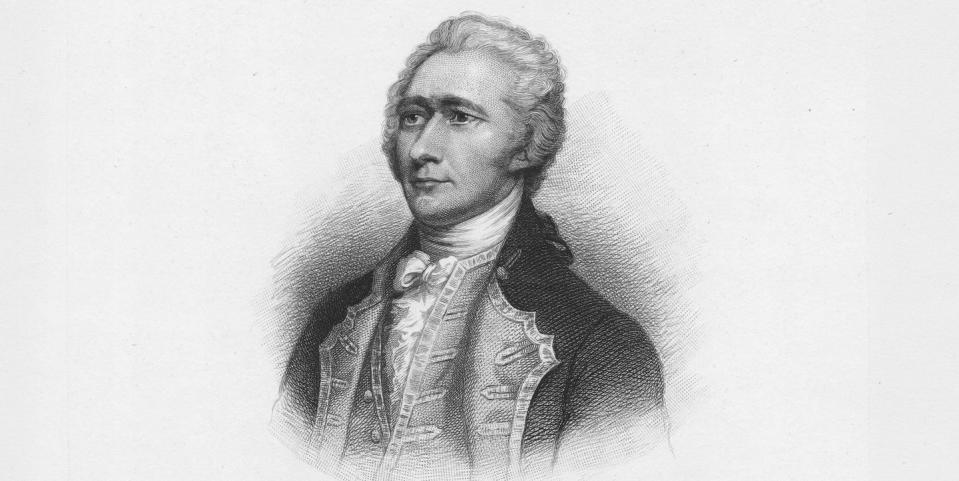It Looks Like Alexander Hamilton Was Not, In Fact, Some Heroic Proto-Abolitionist

As a diversion from the ongoing, rolling calamity that is the presidential transition, there are a couple of fascinating studies in revisionist history elsewhere. The first involves Alexander Hamilton, star of stage and screen. One of the more troublesome aspects of the Smash Hit Musical was its portrayal of Hamilton as a kind of proto-abolitionist. Now, it seems, that aspect is even more of a problem. From the New York Times:
In the paper, titled “‘As Odious and Immoral a Thing’: Alexander Hamilton’s Hidden History as an Enslaver,” Jessie Serfilippi, a historical interpreter at the mansion, examines letters, account books and other documents. Her conclusion — about Hamilton, and what she suggests is wishful thinking on the part of many of his modern-day admirers — is blunt. “Not only did Alexander Hamilton enslave people, but his involvement in the institution of slavery was essential to his identity, both personally and professionally,” she writes. “It is vital,” she adds, “that the myth of Hamilton as ‘the Abolitionist Founding Father’ end.”
Annette Gordon-Reed and Joanne Freeman, both respected scholars of the founding era—Gordon-Reed won a Pulitzer for her work on Thomas Jefferson and the Hemings family, and Freeman is the editor of the Hamilton papers for the Library of America—are quoted as supporting Serfilippi's work as yet another step in the country's overdue reckoning with how thoroughly saturated by the slave economy the first years of the republic were. In fact, as long as we're talking Broadway musicals, the showstopper "Molasses to Rum" from 1776, in which Edward Rutledge of South Carolina arraigns his northern colleagues for their "high-pocrisy" on the subject, may be closer to the truth of things than the more recent sensation was.
Travis Bowman, the senior curator for the New York State Bureau of Historic Sites, who supervised the internal review of Ms. Serfilippi’s paper, said the relative lack of research on enslaved people in Hamilton’s household partly reflects the overall paucity of scholarship on Northern slavery. And the complexities of gradual abolition (New York’s gradual abolition law of 1799 phased slavery out over decades) makes tracking enslaved people, and clearly determining their status, particularly difficult. “It’s a very odd period,” Mr. Bowman said. “Many people were granting half-freedom. If enslaved people walked away, they didn’t go after them.”
The other story dings up the halo of the man now called St. John Paul II. A Vatican report indicates that JPII was fully aware of the allegations of sexual abuse against Cardinal Theodore McCarrick, former archbishop of Washington, D.C. for decades, and did nothing about them. From the Washington Post:
The report, released two years after Pope Francis authorized an internal investigation, represents the Vatican’s most comprehensive effort to provide transparency about a major abuse case and provides a stunning play-by-play of how church leaders disregarded clues about McCarrick’s misconduct, believed “church men” over victims, and tried to keep any discipline modest and private. John Paul II was informed in 1999 that the then-bishop shared a bed with young seminarians but decided nonetheless to appoint McCarrick as archbishop of Washington and later name him as a cardinal.
The official alibi seems to be that JP II was lied to and misled about McCarrick and, in truth, none of the last three popes come off looking very good, although Papa Francesco finally did move on the guy. The reasons seem to have been closer to earth than to heaven.
He also earned clout as a formidable church fundraiser, giving money not just to charities but also directly to other clerics — including the ones in the Vatican who would have been involved in assessing the misconduct claims against him. According to the report, there was no evidence “that McCarrick’s gift-giving and donations impacted significant decisions made by the Holy See regarding McCarrick during any period.”
As a longtime connoisseur of euphemisms for "bribery," I have to admit that's a corker right there.
You Might Also Like

 Yahoo Finance
Yahoo Finance 